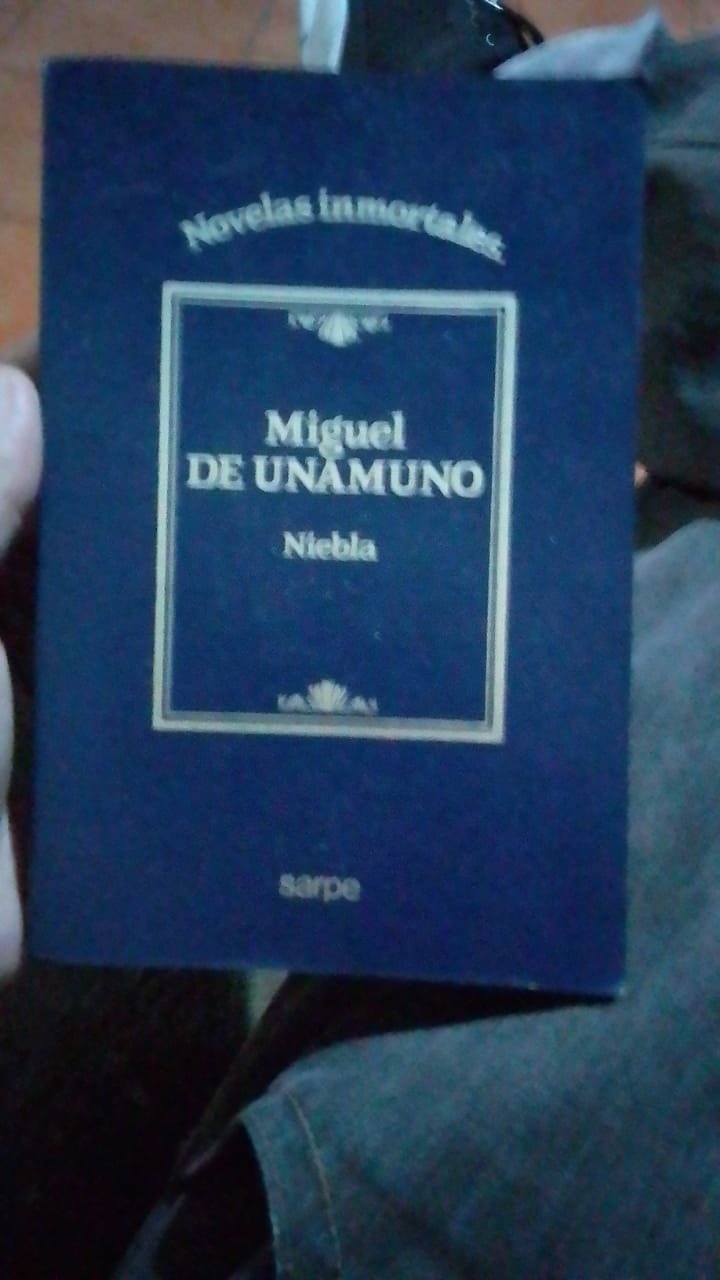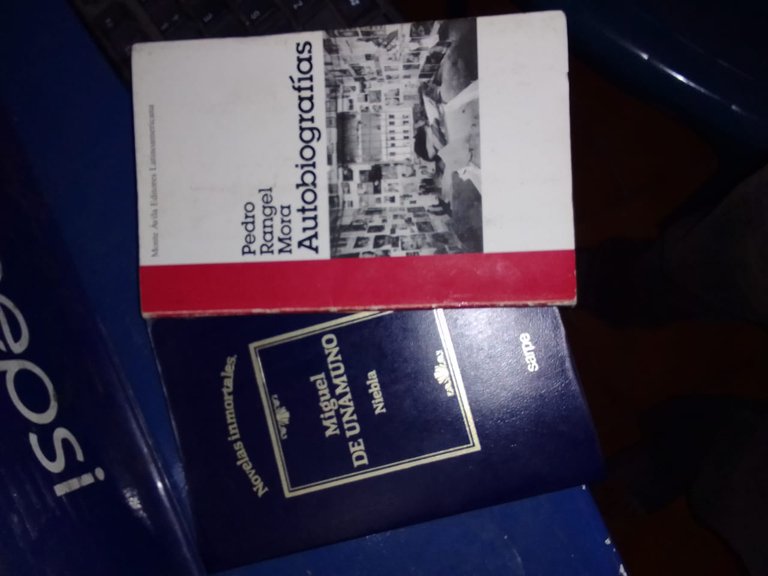La influencia de Niebla de Miguel de Unamuno.

Recientemente realice la lectura de una de las novelas metaliterarias más famosas y antiguas de la literatura española: Niebla de Miguel de Unamuno. Novela que influenció evidentemente a muchos otros autores que incursionaron en estos recursos metaficcionales o autorreferenciales, solo por mencionar algunos tenemos a Macedonio Fernández, Jorge Luís Borges, Antonieta Madrid, Eduardo Liendo, Isaac Rosa, y no sé por qué pero a pesar de que sé alguito del tema, pues no me llega ninguno otro a la cabeza. Típica situación de un perro que hace un truco, pero solo cuando no vienen los invitados.
.
Compré la novela en La Feria del Libro organizada por Casa Italia para conmemorar el Día Internacional del Libro en Maracay, Aragua el 23 de abril de este año, y de inmediato me puse a leer.
I bought the novel at the Book Fair organized by Casa Italia to commemorate International Book Day in Maracay, Aragua on April 23 of this year, and immediately started reading.

Fuente

Foto de la feria donde compré el libro.
A photo from the fair where I bought the book.

Ese día también me reencontré con mi maestro Ricardo Farfán, profesor universitario de Lengua y Literatura.
That day I also met again my master Ricardo Farfán, professor of Language and Literature.

Veamos como Unamuno influenció a muchos autores a través de algunos casos de escritores de este tipo de historias. Debo acotar que no tengo intención de sonar como un crítico, pues no tengo esas credenciales ni pericia teórica. Tampoco tengo intención alguna de reseñar los sucesos de la novela. Este es un comentario libre que imagino se me puede ir de las manos, como se le va Augusto Perez de las manos a Unamuno. O al menos eso nos hace pensar.
Comencemos por Macedonio Fernandez, autor de Museo de la Novela de la Eterna. Una de esas novelas/nivolas/antinovelas o lo que sea que se haya propuesto este escritor argentino. Niebla comienza por un prólogo escrito por uno de sus personajes, Víctor Goti quien en resumidas cuentas se atreve a hacer el comentario del estilo del propio Unamuno en otras de sus obras, crítica incluso a la propia Niebla a su modo y habla de sus propios pensamientos sobre el panorama literario español de la época. Pues bien, Macedonio en Museo de La Novela de la Eterna exageró este recurso al escribir como 50 prólogos que escriben varios autores, personajes de la novela e incluso y si la memoria no me falla también introduce un prólogo del lector. Sí, del lector “fictivizado” (siempre quise escribir eso). Y si no lo hace en el prólogo, pues al menos sí es seguro que lo hace en “la novela.” De hecho, la novela es más corta que los prólogos. En esos prólogos la obra hace su propio análisis, incluso un casting de los personajes, y hasta el “des-casting.” Unamuno al hacer la crítica de su novela nos dio uno de los puntos más recurrentes de la metaliteratura: la obsesión de la novela por sí misma; el narcicismo neurótico bien en personajes o en el autor.
Unamuno realiza un juego de palabras tremendo entre Niebla y novela, lo cual consuma su “nivola.” Por su parte, Macedonio Fernández sigue ese legado al incluir en su ficción una casa llamada “La Novela” y un personaje llamado “Eterna.” Lo cual crea un efecto cómico bastante marcado a través de su novela. Dicho sea de paso que es notorio que Niebla es una tragicomedia con bastante peso en el sentido del humor. Lo mismo ocurre en la obra de Macedonio solamente que esto se diluye por el motivo del cual hablaré a continuación.
Otro punto en el que Unamuno influenció a Fernández fue en su ideal de confundir al lector, que la lectura no le sirviese para saber o atenerse a alguna certeza sino para perderse precisamente como en una niebla. Macedonio Fernández no es un autor sencillo. Introduce en su novela tal cantidad de argumentos metafísicos y ontológicos tan enrevesados que uno sale más confundido de lo que llegó. Tal vez en este punto debo ser más incisivo. Toda la literatura autorreferencial, metaficcional, crea ese efecto de confusión, creo que le llaman narración entrópica. Llega el punto en que la trama se torna en un caos microcósmico y uno queda envuelto en él, envuelto en la niebla/nivola o lo que sea.
Como comentario extra, aquí a vuelo de pájaro, la novela Niebla introduce un recurso novedoso que luego se convirtió en el cliché de las historias metaliterarias: la novela te hace saber que es una novela, constantemente hace referencia a su condición de literatura, de ficción. Como dije antes es un obsesión narcisista. Primero de forma subrepticia y algo discreta te da pistas de que habrá un desajuste en la narración para luego y de golpe hacerlo abiertamente introduciendo comentarios del autor y rebelando a los personajes.
En fin, sigamos con otro autor.
Borges, el eterno Borges, quien siempre se colocó a sí mismo como personaje de infinidad de sus cuentos, se hace a sí mismo un “ente de papel” y además refiere a una cantidad pasmosa de autores inventados lo cual es otro elemento que existe en Niebla, si recordamos el personaje del erudito Antolín Paparrigopoulos (solo escribir eso me causó una tremenda fátiga). Me atrevo a decir que Borges toma estas ideas en buena parte de Unamuno. Por supuesto, totalmente a su manera. A Borges no se le rebeló ningún personaje hasta donde recuerdo y no tuvo tono cómico, Borges es bastante sobrio. Sus personajes son amigos suyos, como Bioy Casares, o mujeres ficticias que ha amado como en El Zahir o El Aleph. Y sus aventuras pues son las de un académico, pues aventuras en libros peligrosos. Parece no haber mejor manera de romper con las fronteras entre realidad/ficción que haciéndose a sí mismo personaje de sus historias. Unamuno y Borges nos dejan eso claro.
Otro recurso bastante central en esta novela, y que luego se ha visto muchísimo en escritores posteriores, es el mantenimiento de un dialogo entre las obras del propio Unamuno. Lo que creo que llaman intratextualidad. La obra hace dialogo con las ideas filosóficas, pedagógicas y con la trama de las demás novelas de Unamuno. Pensemos en escritores como Mempo Giardinelli, Ernesto Sábato, el propio Borges en cierta medida, y otros que repito no tengo neuronas como para acordarme. Todos insisten en la creación de su propio universo de la mención explícita a sus otros entes de papel.
Tanta es la influencia de Unamuno que incluso en el cine una película como “Más Extraño que La Ficción” tiene una fuerte inspiración en La Niebla tanto por ser una tragicomedia como por la relación que de algún modo se termina dando entre personaje y autora. Hay varios paralelismos en el esquema de ambas obras entre Harold Crick personaje interpretado por Will Ferrel y Augusto Pérez. Ambos llevan una vida carente que solo comienza a tener algo de sabor al conocer a una mujer, ambos concluyen que su autor seguramente va a matarlo, y debe emprender su búsqueda para impedirle hacerlo. Claro, Hollywood no es muy fan de los finales agrios… De cualquier modo esto es básicamente lo que llaman la ruptura de la lógica tradicional del relato y que es un recurso sumamente explotado en la metaficción. Otras películas metaficcionales son Animales Nocturnos de Tom Ford, Synecdoque, New York de Charlie Kaufman, *Adaptación de Spike Jonze escrita por el propio Kaufman que tiene en su haber varias películas con estos recursos y otra vez la mente me falla.
¿Existe alguna otra característica de este tipo de textos que no posea Niebla? Me atrevo a mencionar solo uno: no hay relato autoenmarcado como ocurre en esas novelas que tienen a la propia novela dentro, solo por citar un caso los manuscritos de Melquiades que contienen a su vez toda la historia de Cien Años de Soledad. ¡Espera! Miento. Pobre de mi mente. Acabo de recordar que Víctor Goti está prácticamente escribiendo la misma novela Niebla. ¿Cómo se me puede pasar por alto que Goti y Unamuno saben las mismas cosas, usan los mismos términos y comparten los mismos secretos? Ha de ser el calor que ya me quemó las últimas capacidades mentales que tengo.
No, ya en Niebla está prefigurado todo un género, todo un estilo. Y pareciera que esa es en buena parte la fuente más organizada de todo lo que vino después si hacemos la excepción de Don Quijote de La Mancha. En todo caso le debemos muchísimo a los dos grandes Migueles de la literatura española.
Hay muchas cosas que me gustaron de la novela además de estos recursos. Voy a mencionar el principal factor: la ironía tan pesada que cubre a todos los personajes. Augusto ama, vive pero a su vez comienza a amar a todas las mujeres, y por eso tiene el defecto de realmente no llegar a amar a ninguna. Víctor y su mujer querían un hijo, se rinden, cuando finalmente llega más bien se afligen por esa intrusión. Y de nuevo una vez que nace, pues lo aman. El tío de Eugenia es un anarquista místico y dice que Dios obedece, jajajajajaja. Y para acabar con más ironía no saber si Unamuno controla o no a sus personajes. Hermoso final narrado por un perro disertando sobre la perra naturaleza humana.
Finalmente, voy a permitirme un momento narcisista neurótico. Al fin y al cabo hablamos de metaficción. Hace un tiempo escribí una letra para una de mis bandas en la que mi personaje se revela contra su autor cuando se da cuenta de que no este planea hacerlo suicidarse. Es demasiado similar a Niebla cuya trama desconocía yo en aquel momento. Hay libros que parecen influenciarlo a uno sin haberlos leído, como si uno entablara un dialogo con ellos pero en des-tiempos, o en ramificaciones fragmentarias del pasado y futuro.
Y ahora me dirijo a mi siguiente lectura que tengo tiempo esperando.
Las Autobiografías de Pedro Rangel Mora.

Gracias por tomarte el tiempo de leerme. Sigueme si quieres ver más de este contenido, poesía, reseñas, comentarios, humor y reflecciones sobre esta locura colectiva que llamamos vida.
The influence of “Mist” by Miguel de Unamuno.
The first thing I have to say in English is that this novel represents a translation problem since the author created a rich pun with the words novela, niebla and nivola which mean “novel” and “mist” correspondingly. So the “nivola” is a kind of novel which is confusing as the mist. That’s the author’s intention. Imagine how hard it was for the English translators to find a way to preserve the original meaning! I think it was a titanic labor. I am quite sure those puns across the novel represented a huge problem for translators in all languages since the novel has been translated to thousands of them.
I recently read Niebla by Miguel de Unamuno, the most famous, oldest and most important metaliterary novels of the Spanish literature. Well, I should say of the history of literature itself. This novel influenced evidently several that ventured later into those metafictional or self-referential techniques. Just for mentioning some of these authors, Macedonio Fernandez, Jorge Luis Borges, Julio Cortazar, Antonieta Madrid, Isaac Rosa, and I don’t know why but in spite of the fact that I know a bit about the topic, I can’t remember any other name. The typical situation in which a dog plays a trick but only when there are no guests…
Let’s see how Unamuno influenced these authors through his novel. I must warn you that I have no intention to sound like a critic because I have no such credentials neither I have such theoretical insights. This is not a summary of the novel. This is just a free comment that I think could get out of my hands as Augusto Perez got out of Unamuno’s hands. Or at least that’s what he made us think.
Let’s start with Macedonio Fernández, the author of The Museum of Eterna's Novel one of those experimental novels/antinovels or whatever the author wanted it to be. Mist begins with a prologue written by one of its characters, Victor Goti, who to make the story short, talks about Unamuno’s style in other of his works, he criticizes the novel Mist itself, and he also talks about Unamuno’s thoughts about the literary scene in Spain back then. What does it have to do with Fernández? Well, in his novel Fernández put around 50 prologues written by several invented authors, characters of his novel, and if my memory is not so bad, I do remember that one of the prologues is written by the reader. Yes, the “fictivized” reader. And if he doesn’t do that in the prologue, he appears for sure later in the novel. As a matter of fact, the novel is quite shorter than the prologues. On these prologues the novel criticizes itself, it does even its own casting and a discarding of characters. When Unamuno criticized his own novel he gave us one of the most recurrent characteristics of metaliterature: the obsession of the novel with itself: neurotic narcissism in the author or in the characters.
Unamuno uses a pun with the words novel and mist (niebla) what ends in “Nivola.” Fernández kept this legacy when he introduced in his novel a house called “The Novel” and a character named “Eterna.” This plays a comic effect throughout the novel. And it must be remarked that Mist is a tragicomedy with a strong emphasis in the sense of humor. And the same occurs with Macedonio’s work, however, this is less noticeable because of the following reason.
Another point in which Unamuno influenced Fernández was in his ideal of confusing the reader, that reading would not serve him to know or stick to some certainty but to get lost precisely as in a mist. Macedonio Fernández isn’t an author easy to grasp. He introduced a huge amount of metaphysical, ontological and mystical arguments that are so entangled that one finishes the reading with no idea of what just read. May be I must be a bit more emphatic on this idea. The whole of the metafictional works create such effect of confusion, I think that’s called entropic narration or at least that’s the name in Spanish. There is a point that the plot turns into a microcosmic chaos and one gets involved in the mist. (I wanted to put here a pun about the nivola, but I haven’t read this novel in English and I don’t know how they solved that translation problem).
As an extra comment, the novel Mist introduced a new technique that became in the cliché of metaliterature: the novel knows it is a novel and it lets you know that, it’s constantly talking about its fictional condition. As I said before that’s part of the narcissistic obsession. These novels do that first through giving you discrete clues to discover the truth behind, and after that they suddenly and explicitly release a narrative dislocation and rebel characters against authors or against their own fictional reality.
Anyway, let's continue with another author.
Borges, the eternal Borges, who always placed himself as a character in countless of his stories, made himself a "paper entity" and also refers to an astonishing number of invented authors, which is another element that exists in Fog, if we remember the character of the scholar Antolín Paparrigopoulos (just writing that caused me tremendous fatigue). I dare to say that Borges took these ideas largely from Unamuno. Totally in his own way, of course. Borges did not rebel any character against himself as far as I remember and did not have a comic tone, Borges is quite sober. His characters are his friends, like Bioy Casares, or fictional women he has loved, like in El Zahir or El Aleph. And his adventures are those of an academic, adventures in dangerous books though. There seems to be no better way to break the boundaries between reality/fiction than by making himself a character in his stories. Unamuno and Borges make that clear to us.
Another quite central resource in this novel, and which has been seen a lot in later writers, is the maintenance of a dialogue between the works of Unamuno himself. What I think they call intratextuality. The work dialogues with the philosophical and pedagogical ideas and with the plot of the other novels by Unamuno. Let's think about writers like Mempo Giardinelli, Ernesto Sábato, Borges himself to a certain extent, and others that I repeat my brain cells are not working quite well to remember. They all insist on creating their own universe from the explicit mention of their other paper entities.
Such is the influence of Unamuno that even in the cinema a film like "Stranger than Fiction" has a strong inspiration in Mist both for being a tragicomedy and for the relationship that somehow ends up between character and author. There are several parallelisms in the scheme of both works between Harold Crick character played by Will Ferrel and Augusto Pérez. They both lead a life of lack that only begins to have some flavor when they meet a woman, they both conclude that its perpetrator is surely going to kill him, and he must go on his quest to stop him from doing so, and instead of solving their problems with a psychologist they have to meet a scholar. Of course, Hollywood is not a big fan of sour endings... In any case, this is basically what they call the rupture of the traditional logic of the story and that is a highly exploited resource in metafiction.Other metafictional films are Nocturnal Animals by Tom Ford, Synecdoque, New York by Charlie Kaufman, Adaptation by Spike Jonze written by Kaufman himself who has several movies with these resources and again my mind is failing.
Is there any other characteristic of this type of text that Mist does not have? I dare to mention just one: there is no self-framed story as occurs in those novels that have the novel itself inside written in a shorter version. Just to cite one case, the Melquiades manuscripts that contain the entire story of One Hundred Years of Solitude. Wait! I lie. Poor of my mind. I just remembered that Víctor Goti is practically writing the same novel. How can I ignore the fact that Goti and Unamuno know the same things, use the same terms and share the same secrets? It must be the heat that has already burned the last mental capacities I have. Victor Goti reveals through some apparently naïve comments his ideas (Unamuno’s ideas) to write a novel that contain the same features that appear constantly on Mist’s Plot.
No, already in Niebla a whole genre is prefigured, a whole style. And it seems that this is largely the most organized source of everything that came later if we make the exception of Don Quixote de La Mancha. In any case, we owe a great deal to the two great Migueles of Spanish literature.
There are many things I liked about the novel besides these resources. I'm going to mention the main factor: the heavy irony that covers all the characters. Augusto loves Eugenia for no apparent reason, and that is why he lives, but in turn he begins to love all women, and for this reason he has the defect of not really loving any of them. Víctor and his wife wanted a child, they give up, and when they finally and accidentally they rather grieve over that intrusion of the baby. And again once it is born, well, they love it. Eugenia's uncle is a mystical anarchist and says that God obeys, hahahahahaha. And to end with more irony, not knowing if Unamuno controls his characters or not. And the beautiful ending narrated by a dog lecturing on dog-like human nature.
Finally, I am going to allow myself a neurotic narcissistic moment. After all, we are talking about metafiction. Some time ago I wrote a lyric for one of my bands in which my character rebels against its author when he realizes that the author is not planning to make him commit suicide. It is too similar to Mist whose plot I did not know back at that time. There are books that seem to influence one without having read them, as if one entered into a dialogue with them but at the wrong times, or in fragmentary ramifications of the past and future.
And now I turn to my next reading that I have been waiting for for a long time.
The Autobiographies of Pedro Rangel Mora

Thanks for reading! Follow me if you want to see more of my future content. Poetry, summaries, and reflections about this collective nonsense we call life.
Giving you a tip instead of a vote because I am replenishing my VP for the day. I couldn't resist commenting. Your blog brings me great delight. I once (many years ago) wrote a very long paper on the relationship between Unamuno and Borges. For me, Unamuno is the more affecting writer because he displays such empathy in his work. Borges is brilliant, but a little more clinical in his treatment of the human condition.
I would like to point out that Unamuno is part of a long line of influences in Spanish literature, reaching back to Cervantes. He himself wrote about this--the evolution of the concept of self.
I love your writing style. It is not at all pretentious. You speak to us and your enjoyment of the pieces is evident--contagious. I add that my Spanish (reading comprehension) is adequate, but less than it used to be :) Some skills do diminish with age.
Thanks for a great read and re-introduction to writers that moved me.
Congratulations @isaack95! You have completed the following achievement on the Hive blockchain and have been rewarded with new badge(s):
Your next target is to reach 400 upvotes.
You can view your badges on your board and compare yourself to others in the Ranking
If you no longer want to receive notifications, reply to this comment with the word
STOPCheck out the last post from @hivebuzz:
Support the HiveBuzz project. Vote for our proposal!
!discovery 25
This post was shared and voted inside the discord by the curators team of discovery-it
Join our community! hive-193212
Discovery-it is also a Witness, vote for us here
Delegate to us for passive income. Check our 80% fee-back Program
Your content has been voted as a part of Encouragement program. Keep up the good work!
Use Ecency daily to boost your growth on platform!
Support Ecency
Vote for new Proposal
Delegate HP and earn more